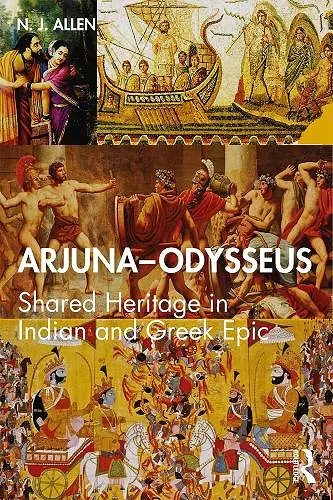Arjuna–Odysseus
Shared Heritage in Indian and Greek Epic
Format:Paperback
Publisher:Taylor & Francis Ltd
Published:20th Nov '19
Currently unavailable, and unfortunately no date known when it will be back
This paperback is available in another edition too:
- Hardback£145.00(9780367260477)

Bringing together the study of the Greek classics and Indology, Arjuna–Odysseus provides a comparative analysis of the shared heritage of the Mahābhārata and early Greek traditions presented in the texts of Homer and Hesiod.
Building on the ethnographic theories of Durkheim, Mauss, and Dumont, the volume explores the convergences and rapprochements between the Mahābhārata and the Greektexts. In exploring the networks of similarities between the two epic traditions, it also reformulates the theory of Georges Dumézil regarding Indo-European cultural comparativism. It includes a detailed comparison between journeys undertaken by the two epic heroes – Odysseus and Arjuna – and more generally, it ranges across the philosophical ideas of these cultures, and the epic traditions, metaphors, and archetypes that define the cultural ideology of ancient Greece and India.
This book will be useful to scholars and researchers of Indo-European comparativism, social and cultural anthropology, classical literature, Indology, cultural and post-colonial studies, philosophy and religion, as well as to those who love the Indian and Greek epics.
‘This is a volume for the ages. N. J. Allen is the dean of British comparativists; and no one has perceived more clearly or argued more persuasively for the shared structures of Greek and Sanskrit epic, features commonly held by cause of common ancestry. These twenty-four chapters are jewels, every one, to be read and re-read: rejoice in their brilliance.’
Roger D. Woodard, Andrew van Vranken Raymond, Professor of the Classics, University of Buffalo (The State University of New York)
‘Every educated person knows that the languages of north India are related to those of Europe and that they all derive, in the distant past, from an Indo-European forebear spoken on the steppes of Russia. But how many realize that the key motifs and stories of the Iliad and Odyssey – so often heralded as the beginning of European literature, somehow springing fully formed from the brain of Homer – in fact go back likewise to those ancient beginnings and share that origin with South Asia’s great epics, the Ramayana and the Mahābhārata? No one has pursued the comparisons that prove this common origin point with such tenacity and persistence as N. J. Allen. The publication of a collection of his essays on this theme, essays previously scattered in obscurity, is a major scholarly event and should mark the coming of age of Indo-European Cultural Comparativism.’
David N. Gellner, Professor of Social Anthropology, University of Oxford
‘N. J. Allen’s Arjuna–Odysseus extends the foundational work of Georges Dumézil by supplying an anthropological dimension to Indo-European studies. Allen brings to bear his sensibility as an ethnographer of South Asia, his long-term engagement with Greek and Indic texts, and an expansive knowledge of anthropological theory and comparative ethnography built up over decades of teaching. The result is a feast of insightful case studies that advance a new understanding of Indo-European cultural ideology while making a major contribution to the study of epic poetry in ancient Greece and India.’
Charles Stewart, Professor of Anthropology, University College London
‘This is a volume for the ages. N. J. Allen is the dean of British comparativists; and no one has perceived more clearly or argued more persuasively for the shared structures of Greek and Sanskrit epic, features commonly held by cause of common ancestry. These twenty-four chapters are jewels, every one, to be read and re-read: rejoice in their brilliance.’
Roger D. Woodard, Andrew van Vranken Raymond, Professor of the Classics, University of Buffalo (The State University of New York)
‘Every educated person knows that the languages of north India are related to those of Europe and that they all derive, in the distant past, from an Indo-European forebear spoken on the steppes of Russia. But how many realize that the key motifs and stories of the Iliad and Odyssey – so often heralded as the beginning of European literature, somehow springing fully formed from the brain of Homer – in fact go back likewise to those ancient beginnings and share that origin with South Asia’s great epics, the Ramayana and the Mahābhārata? No one has pursued the comparisons that prove this common origin point with such tenacity and persistence as N. J. Allen. The publication of a collection of his essays on this theme, essays previously scattered in obscurity, is a major scholarly event and should mark the coming of age of Indo-European Cultural Comparativism.’
David N. Gellner, Professor of Social Anthropology, University of Oxford
‘N. J. Allen’s Arjuna–Odysseus extends the foundational work of Georges Dumézil by supplying an anthropological dimension to Indo-European studies. Allen brings to bear his sensibility as an ethnographer of South Asia, his long-term engagement with Greek and Indic texts, and an expansive knowledge of anthropological theory and comparative ethnography built up over decades of teaching. The result is a feast of insightful case studies that advance a new understanding of Indo-European cultural ideology while making a major contribution to the study of epic poetry in ancient Greece and India.’
Charles Stewart, Professor of Anthropology, University College London
ISBN: 9780367348304
Dimensions: unknown
Weight: 498g
350 pages